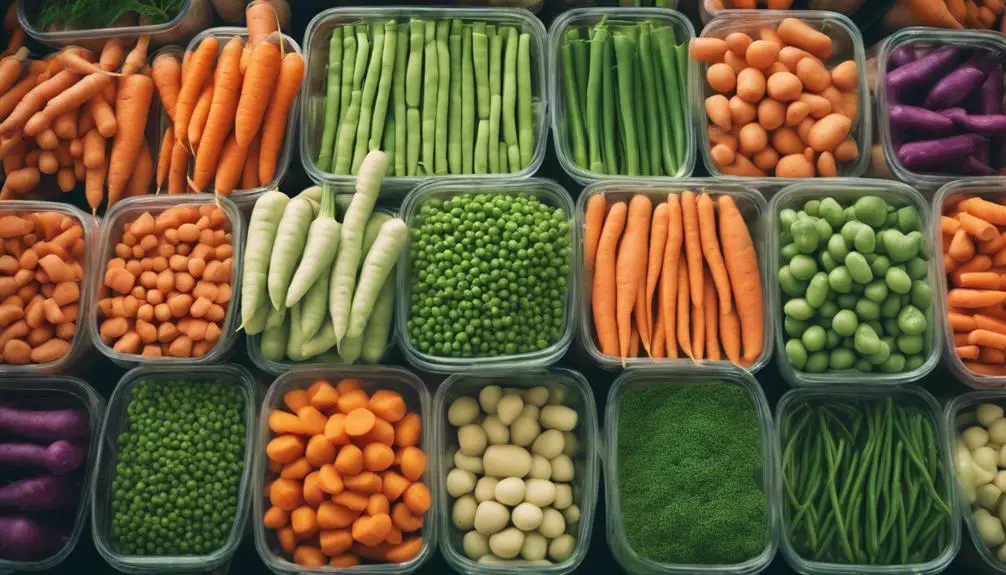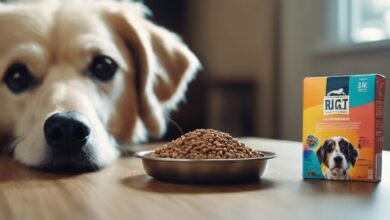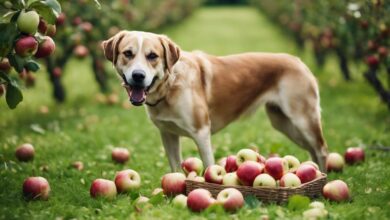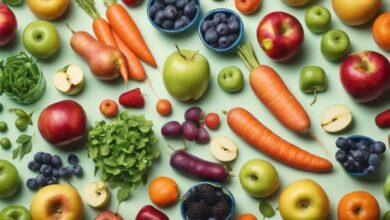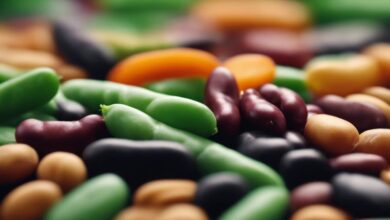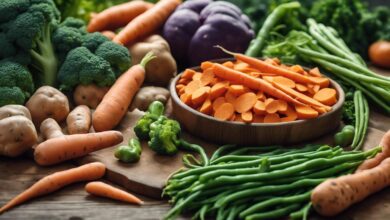What Veg Can Dogs Eat
Guarantee your furry friend enjoys safe and beneficial veggies like carrots, green beans, sweet potatoes, and peas. These provide essential nutrients, fiber, and vitamins. Remember to prepare them by steaming or boiling without harmful seasonings. Keep in mind to cut them into bite-sized pieces for easier digestion. Store leftovers properly for freshness. Learn more about the benefits, how to prepare, and other veggies to avoid for your dog's health and happiness. Your pup will thank you for the delicious and nutritious treats!
Key Takeaways
- Carrots, green beans, sweet potatoes, peas are safe and nutritious for dogs.
- Veggies provide essential vitamins, minerals, and fiber for overall health.
- Avoid onions, garlic, avocado, raw potatoes, and high-sugar vegetables.
- Prepare veggies by washing, cutting, steaming, and avoiding harmful seasonings.
- Store prepared veggies in airtight containers in the fridge or freezer for longer shelf life.
Benefits of Feeding Vegetables to Dogs
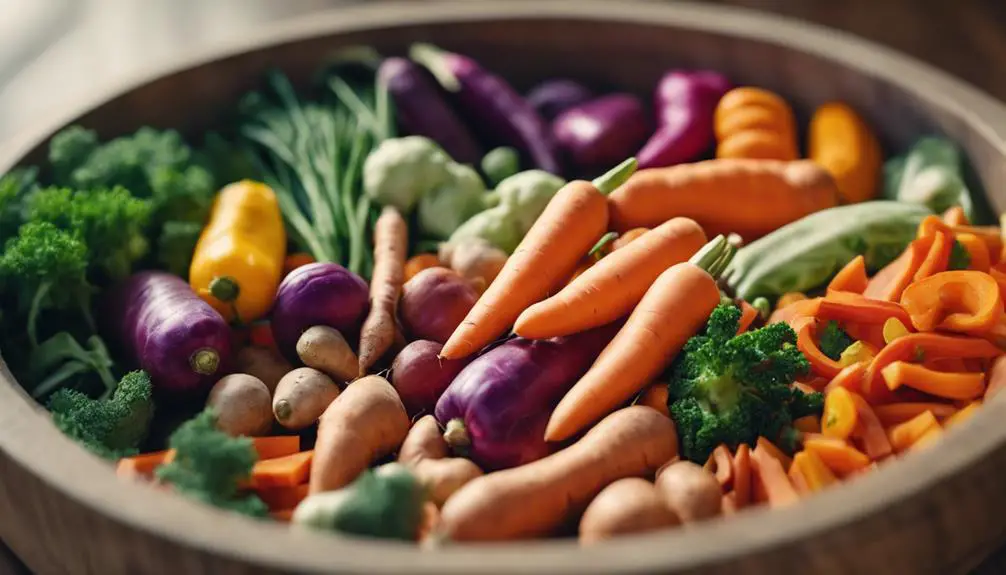
Feeding vegetables to your dog can offer numerous health benefits, including providing essential vitamins and minerals for their overall well-being. Vegetables contribute to digestive health by adding fiber to your dog's diet, aiding in smooth digestion and preventing constipation. Additionally, the nutrients in vegetables can give your dog an energy boost, keeping them active and vibrant throughout the day. When included in their diet, vegetables also play an essential role in maintaining coat health, promoting a shiny and lustrous fur texture. Furthermore, incorporating vegetables can assist in weight management, as they are low in calories and can help your dog feel full without consuming excessive amounts of food. Overall, vegetables are a valuable addition to your dog's diet, offering a range of health benefits.
Dog-Friendly Vegetables List
When considering the best diet for your canine companion, it is crucial to make sure of the variety of vegetables that are safe and beneficial for their health. Some dog-friendly vegetables include carrots, green beans, sweet potatoes, and peas. These veggies are not only safe but also provide essential nutrients like fiber, vitamins, and minerals that can contribute to your dog's overall well-being. You can incorporate these vegetables into your dog's diet by steaming or boiling them to make them easier to digest. Additionally, you can use these veggies to create tasty veggie treats or include them in homemade veggie recipes for your furry friend. Just confirm that the vegetables are prepared plain without any added seasonings or ingredients that may be harmful to dogs.
How to Prepare Veggies for Dogs
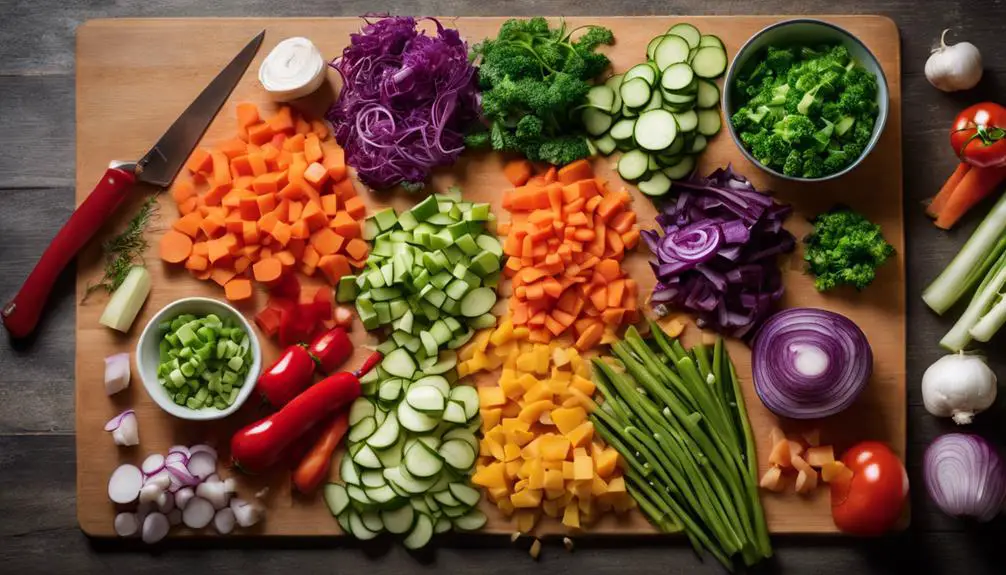
To properly prepare vegetables for your canine companion, make sure they are thoroughly washed and cut into bite-sized pieces before serving. This guarantees easy digestion and reduces the risk of choking. Below are some cooking tips and storage methods to help you prepare veggies for your dog:
| Cooking Tips | Storage Methods |
|---|---|
| Steam veggies lightly | Store in airtight containers in the fridge |
| Avoid seasoning with salt or spices | Freeze in portions for longer shelf life |
| Use homemade broths for added flavor | Keep fresh veggies dry to prevent mold |
| Puree for older dogs or those with dental issues | Check for spoilage regularly |
When using seasonal produce, consider making homemade treats like vegetable-based dog biscuits to provide your furry friend with nutritious snacks.
Vegetables to Avoid for Dogs
When it comes to feeding your furry friend, it's important to know which vegetables to steer clear of. Some veggies can be toxic to dogs and pose potential health risks if consumed. Be cautious and aware of these harmful vegetables to keep your dog safe and healthy.
Toxic Vegetables
For the safety of your canine companion, it is important to be aware of the vegetables that are toxic to dogs. Some common vegetables can pose significant risks to your dog's health if ingested. To guarantee your pet's well-being, it's vital to avoid feeding them the following toxic vegetables:
| Toxic Vegetables | Potential Risks |
|---|---|
| Onions | Can cause anemia |
| Garlic | Can lead to organ damage |
| Avocado | Contains persin, which is toxic to dogs |
| Raw Potatoes | Can be harmful due to solanine content |
Potential Health Risks
Knowing which vegetables to avoid feeding your dog is crucial for safeguarding against potential health risks that could harm your furry friend. Some vegetables can lead to digestive issues or allergies in dogs. Avoid feeding your dog onions, garlic, or chives as they can cause gastrointestinal upset and damage to red blood cells. Additionally, steer clear of vegetables like avocado, which contain persin and can be toxic to dogs. Vegetables high in sugar content, such as corn, should also be avoided as they can contribute to weight management issues and dental health problems in dogs. By being mindful of these potential risks and making informed choices about the vegetables you offer your dog, you can help protect their well-being and health.
Nutritional Value of Canine Veggies
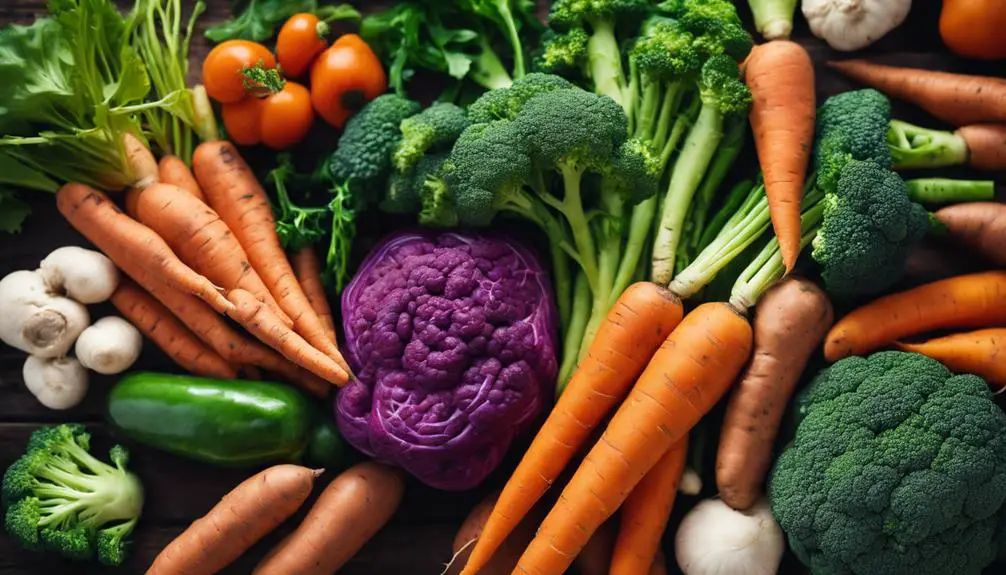
When considering the nutritional value of vegetables for your canine companion, it's crucial to comprehend the benefits these veggies can offer. Some vegetables provide key vitamins, minerals, and fiber that can contribute to your dog's overall health. Identifying the best veggies for canines can help guarantee that your furry friend receives a well-rounded diet.
Veggie Benefits for Dogs
Veggies are an essential part of your dog's diet, providing valuable nutrients and health benefits. Including veggies in your dog's diet can aid in digestion and promote overall well-being. Below is a table showcasing some of the key nutrients found in various canine-friendly vegetables:
| Vegetable | Nutrient Content | Health Benefit |
|---|---|---|
| Carrots | Beta-carotene, Fiber | Healthy vision |
| Spinach | Iron, Vitamin K | Bone health |
| Sweet Potato | Vitamin A, Fiber | Immune support |
| Green Beans | Vitamin C, Manganese | Healthy skin |
Best Veggies for Canines
To ensure your dog receives high-quality nutrition, understanding the specific advantages of different vegetables in their diet is essential. When it comes to veggie treats for your furry friend, some standout options can greatly benefit their canine diet. Carrots are rich in beta-carotene, promoting healthy eyes and skin. Green beans offer fiber and are low in calories, making them ideal for weight management. Sweet potatoes are packed with vitamins and minerals, supporting overall immunity. Spinach is a superfood for dogs, providing iron and essential nutrients. Incorporating these veggies into your dog's diet can enhance their well-being and offer a variety of health benefits. Remember, moderation is key when introducing new foods to your pet's diet.
Best Ways to Incorporate Veggies
Incorporating vegetables into your dog's diet can be done in various simple and creative ways that benefit their health and well-being. For veggie treat recipes, consider making homemade treats using dog-safe vegetables like carrots, green beans, or sweet potatoes. You can bake these into crunchy snacks or freeze them for a revitalizing treat on hot days. Another option is to mix finely chopped veggies into your dog's regular meals. Veggie filled meal options can include adding steamed vegetables to their kibble or mixing in pureed veggies with their wet food. By incorporating vegetables into your dog's diet through these methods, you can provide them with added nutrients and a tasty variety in their meals.
Monitoring Your Dog's Veggie Intake
Monitoring your dog's vegetable intake is crucial to guarantee they are receiving a balanced diet that meets their nutritional needs. When incorporating veggies into your dog's diet, it is important to keep track of the quantity and variety they consume. Here is a table to help you understand different ways to monitor your dog's veggie intake effectively:
| Type of Monitoring | Description |
|---|---|
| Veggie treats | Limit the number per day |
| Veggie supplements | Consult with a vet |

If Richie Bedard is a dog food expert, author, or any other figure in the field of dog nutrition that emerged after September 2021,
